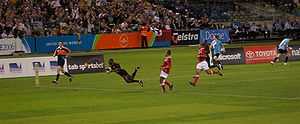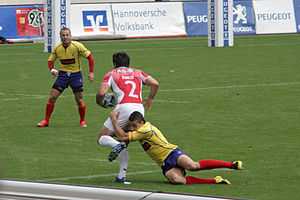Rugby sevens
|
| |
| Highest governing body | World Rugby |
|---|---|
| Nicknames |
The Borders Game[1] The Scottish Game/Code[1] The Abbreviated Code[1] The "Short Game" Seven-a-side Sevens, 7's or 7s and VIIs. |
| First played | 1883 |
| Characteristics | |
| Contact | Full Contact |
| Team members | 7 |
| Mixed gender | Separate competitions |
| Type | Team sport, Outdoor, variant of rugby union |
| Equipment | Rugby ball |
| Presence | |
| Olympic | 2016 onwards |
Rugby sevens, also known as seven-a-side, Sevens or VIIs, is a variant of rugby union in which teams are made up of seven players, instead of the usual 15, with shorter matches. Rugby sevens is administered by World Rugby (WR), the body responsible for rugby union worldwide. The game originated in Melrose where the Melrose Sevens tournament is still played annually. The game is popular at all levels, with amateur and club tournaments generally held in the summer months. Sevens is one of the most well distributed forms of rugby, and is popular in parts of Africa, Asia, Europe, and the Americas, and especially in the South Pacific.[2]
Notable international competitions include the HSBC Sevens World Series and the Rugby World Cup Sevens. Rugby sevens is also played at some multi-sport events such as the Commonwealth Games, taking place five times (1998: Kuala Lumpur, Malaysia; 2002: Manchester, England; 2006: Melbourne, Australia; 2010: Delhi, India; and 2014: Glasgow, Scotland), Until 2014 the gold medal had been won by New Zealand but in 2014 it was won by South Africa.
Rugby sevens is now recognised as an Olympic sport and will make its debut in the 2016 Summer Olympics. This follows a vote by the executive board of the International Olympic Committee (IOC) to include the sport. That decision was backed at the 121st International Olympic Committee Session in Copenhagen on 9 October 2009.[3]
Overview

Rugby sevens is sanctioned by World Rugby, and is played under substantially the same laws (with exceptions noted below) and on a field of the same dimensions as the 15-player game. While a regular rugby union match lasts at least 80 minutes, a normal sevens match consists of two halves of seven minutes with a one-minute half-time break. The final of a competition can be played over two halves of ten minutes each, with a half-time break of two minutes. (In the HSBC Sevens World Series, only the Cup final, which determines the overall winner of an event, is played with 10-minute halves; all finals for lower-level trophies are played with 7-minute halves.[4]) Sevens scores are generally comparable to regular rugby scores; scoring occurs much more frequently in sevens, since the defenders are more spaced out.
The shorter match length allows rugby sevens tournaments to be completed in a day or a weekend. Many sevens tournaments have a competition for a cup, a plate, a bowl, and a shield, allowing many teams of different standards to avoid leaving empty handed.
Sevens tournaments are traditionally known for having more of a relaxed atmosphere than fifteen-a-side games, and are often known as "festivals". As The Encyclopedia of Rugby Union Football (1976) puts it, they gained their "popularity as an end of season diversion from the dourer and sterner stuff that provides the bulk of a normal season's watching."[5]
Fans frequently attend in fancy dress, and entertainment is put on for them.
The Hong Kong Sevens tournament has been especially important in popularising the game in Asia, and rugby sevens has been important as a form of international rugby "evangelism", hence is perhaps the most widely played form of the game, with tournaments in places as far apart as Bogota and Bangkok, Kuala Lumpur and Kenya, Singapore and Scandinavia, as well as the countries in which rugby union is well known.[6]
Playing area
Sevens is played on a standard rugby union playing field as defined in the World Rugby handbook. The field measures up to 100 metres (330 ft) long and 70 metres (230 ft) wide.[7][8] On each goal line are H-shaped goal posts.
Teams and positions
Teams are composed of three forwards and four backs. Scrums are composed of three players from each team. Because of the speedy nature of the game, sevens players are often backs or loose forwards in fifteens rugby.
| Rugby sevens positions | |||||||||||||||||||||||
|---|---|---|---|---|---|---|---|---|---|---|---|---|---|---|---|---|---|---|---|---|---|---|---|
|
- Blue: Forwards
- 1 - Prop
- 2 - Prop
- 4 - Hooker
- Red: Backwards
- 3 - Scrum half
- 5 - Fly-half
- 6 - Centre
- 7 - Winger/fullback
Substitutes are like the 15-player game, but with only 5 subs on the bench.
Variations to the Laws of the Game

There are several variations in laws which apply to Rugby sevens,[9] primarily to speed up the game and to account for the reduced number of players. The main changes can be summarised as follows:
- 7 players per team on field (instead of 15).
- Five substitutes, with five interchanges (instead of 7 and 7).
- Seven-minute halves, though ten-minute halves are allowed in the final of a competition (instead of 40-minute halves, in fifteen-a-side).
- One or two minutes' half-time (instead of ten minutes).
- Matches drawn after regulation are continued into extra time, in multiple 5-minute periods.
- All conversion attempts must be drop-kicked (instead of having the option to place-kick).
- Conversions must be taken within 40 seconds of scoring a try (instead of 60 seconds).
- Three player scrums (instead of eight players).
- Kick-offs: in sevens, the team which has just scored kicks off, rather than the conceding team, as in fifteen-a-side.
- Yellow cards net a 2-minute suspension (instead of 10 minutes).
- Suspensions are more severe in Sevens than in Fifteens. The team plays a man down for 1/7 of the match instead of 1/8, and losing 1 man out of 7 opens up more space than 1 man out of 15.
- Referees decide on advantage quickly (where one play usually ends advantage, unlike in fifteens).
- In major competitions, there are additional officials present (in-goal touch judges) to judge success of kicks at goals and hence the game is not delayed waiting for touch judges to move into position to judge conversion attempts.
History
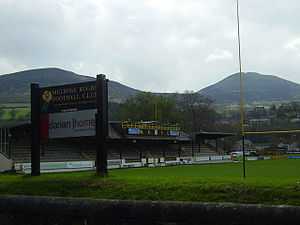
Scottish beginnings
Rugby sevens was initially conceived in 1883 by Ned Haig and David Sanderson, who were butchers from Melrose, Scotland as a fund-raising event for their local club, Melrose RFC. The first ever sevens match was played at the Greenyards, the Melrose ground, where it was well received. Two years later, Tynedale was the first non-Scottish club to win one of the Borders Sevens titles at Gala in 1885.[10]
Despite sevens' popularity in the Borders, it did not catch on elsewhere until the 1920s and 30s.[11] The first sevens tournament outside Scotland was the Percy Park Sevens at North Shields in north east England in 1921.[10] Because it was near to the Scottish Borders, it attracted interest from the code's birthplace, and the final was contested between Selkirk (who won) and Melrose (who were runners up).[10]
In 1926, England's major tournament, the Middlesex Sevens was set up by Dr J.A. Russell-Cargill, a London based Scot.[10] One of the key events in the spread of sevens to England was the Middlesex Sevens, which had some formidable figures on its subcommittee such as Wavell Wakefield and Bill Ramsay.[11] The Middlesex Sevens were also a great fundraiser for charity, and in 1926, they raised £1,600 for King Edward VII Hospital, at a time when standard admission was a shilling, and stand seats cost five shillings.[11]
A 1927 description of the game at the Middlesex Sevens (also for King Edward Hospital) gives an idea of the novelty of the game to English people:
- "You see the field is so open that if a man gets away with the ball a full sized gallop is required to catch him and very often it... wasn't there."[12]
Whereas the Scottish Borders were a rural area, the Middlesex Sevens were near the suburbs of London which was home to millions. 10,000 spectators attended the second Middlesex tournament.[12] And while the Border Sevens had honed the skills of players in the Scottish rugby heartland, the Middlesex Sevens did likewise for London rugby, with locally based players such as the aforementioned Wavell Wakefield, Carl Aarvold (later Recorder of the City of London) of Blackheath FC, Wick Powell of London Welsh RFC, and John Tallent, who would later become chairman of the Four Home Unions Tours Committee.[11] They rubbed shoulders with various invitation sides such as Sale RFC in 1936, which included such players as Wilf Wooller and Claude Davey of Wales and Ken Fyfe of Scotland amongst their backs; and in 1939, Cardiff RFC, which included players such as Wilf Wooller again, and Les Spence and Wendy Davis.[11]
The first ever officially sanctioned international tournament occurred at Murrayfield as part of the "Scottish Rugby Union's Celebration of Rugby" centenary celebrations in 1973.
International development
Due to the success of the format, the ongoing Hong Kong Sevens was launched three years later, in 1976. The Rugby World Cup Sevens, in which the Melrose Cup is contested, was launched in 1993. Three of the best known sevens competitions are the Hong Kong Sevens, Wellington Sevens, and the Dubai Sevens which now make up part of the World Rugby Sevens World Series.
The Scottish connection continued in the foundation of the Hong Kong Sevens in the 1970s, founded largely by expats such as "Tokkie" Smith, and in England, London Scottish RFC was strongly involved in the Middlesex Sevens from the start. The Hong Kong Sevens were ahead of their time, and an influential force in the modernisation of rugby union, for example, the Hong Kong Sevens were one of the first rugby union tournaments to attract major sponsorship, when the airline Cathay Pacific sponsored the 1976 tournament.[13] They also provided a level of cosmopolitan international competition, which tended not to exist in rugby before the first Rugby World Cup in 1987,[14] especially since Hong Kong was not seen as one of the "Big Eight", and other than some involvement with France, the British Commonwealth teams tended to be notoriously clannish. By 1986, the Hong Kong Sevens were held up as a positive example to others:
- "This Seven-a-Side international tournament is without a doubt the most spectacular, exotic, best organised Rugby competition of its kind in the world, and it has consistently produced the highest standard of Sevens Rugby seen anywhere.
- "I was not surprised on my first visit to see quality play from the Australian, New Zealand, Fijian, and British players, but I was staggered at the amazingly high quality play produced by countries I never even knew played Rugby. South Korea and Western Samoa were every bit as good as Japan and Tonga. Indonesia, Thailand and Singapore found their lack of sheer size and bulk an insuperable handicap, but against each other they displayed a range of running and handling skills which demanded unqualified praise. Papua New Guinea, Sri Lanka and the Solomon Islands were inevitably outgunned by the teams from the major Rugby-playing nations but they still have a remarkably high level of skill which promises well for the future of the game.
- "The week of the Hong Kong tournament allows 24 Rugby-playing nations to intermingle for several days, and the huge cross-fertilisation of ideas can only be beneficial in the long term for the emerging nations. After the first day of the play when the top eight seeded teams meet the smaller fish in a pool system, the second day is divided into three different competitions... The strength of this great tournament is that on the opening day the most famous players in the world share a pitch with unknown opponents from countries where Rugby is a minority sport... While tournaments like the Hong Kong Sevens continue to be played, Rugby administrators can be confident that the game will continue to thrive in over 100 countries worldwide."[14]
However, despite this apparent diversity, some of the same old problems which had dogged international rugby were still manifest in the Hong Kong Sevens in the 1980s – for example, in a photograph of the Hong Kong vs Bahrain game at the tournament in 1984, the teams do not appear to include anyone who is ethnically Arabian or Chinese, instead both teams are quite clearly of northern European ethnic origin.[15]
Rugby sevens continues to be popular in the Scottish Borders, where the ten most prestigious of these tournaments make up a league competition known as the "Radio Borders Kings of the Sevens".[16] In honour of the role of Melrose RFC in the creation of rugby sevens, the club was inducted along with Haig to the IRB Hall of Fame in 2008.[17]
Sevens has also taken strong root in the South Sea island nations of Fiji, Tonga, and Samoa, as well as the African nation of Kenya. In many minor rugby nations, such as the case of rugby union in Poland, development has tended to concentrate on rugby sevens as a means of introducing the sport to people.[18] Rugby sevens has become popular in places such as Hong Kong, Singapore and Dubai, which are not so successful in the full fifteen-a-side code. In addition, seven of the 15 current "core teams" that compete in all legs of the HSBC Sevens World Series represent nations that are not within the recognised top tier of the 15-man game — Fiji, Samoa, Kenya, the United States, Canada, Portugal, and Japan.
Major tournaments

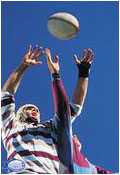
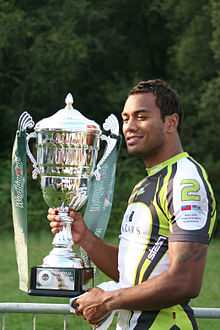
Sevens World Series (men)
New Zealand has been by far the dominant force in the HSBC World Sevens Series, winning twelve out of the 15 seasons. However, in recent years, several other teams have successfully challenged New Zealand's dominance. Fiji, long a power in sevens, were winners in 2005–06; South Africa won in 2008–09; and Samoa claimed the 2009–10 crown. Other strong contenders in recent years have included England, Australia, and Argentina, all of whom have won an event within the last three seasons.[19]
Rugby World Cup Sevens
Sponsored by WR, and held every four years, this tournament had been the highest prize in the Sevens version of rugby union with Fiji being the most successful, having won two out of the five World Cups. However, due to the upcoming introduction of sevens to the Olympics in 2016, the Olympics is now viewed as the most high-profile rugby sevens tournament. Beginning with the next edition in 2018, the World Cup Sevens will be held in the middle of the Summer Olympic cycle (i.e., in the same year as the Winter Olympics).
Summer Olympics
The IOC voted in 2009 to include rugby sevens and golf on the program for the 2016 Olympic Games in Rio de Janeiro, Brazil.[20] The 2016 Summer Olympic program is scheduled to feature 28 sports and a total of 38 disciplines. There were two open spots for sports and initially seven sports began the bidding for inclusion in the 2016 program. The event debuted in an Olympic program at the 2014 Summer Youth Olympics.
Regional tournaments
Rugby sevens has been played at each of the Commonwealth Games every four years since its first appearance at the 1998 Commonwealth Games in Kuala Lumpur, Malaysia. Rugby sevens is now considered a "Core" sport by the Commonwealth Games Federation, necessitating its appearance at all future games. The New Zealand team has won the gold medal 4 times with South Africa winning the tournament at Glasgow 2014 beating the defending champions in the final at Ibrox Stadium on 27th of July. It is one of the two male-only sports at the Commonwealth Games, the other being boxing, although women were allowed to compete in boxing at the 2014 Commonwealth Games in Glasgow.
Rugby sevens is also played at various multisport competitions including the Asian Games, the Pan American Games, and the Pacific Games. Rugby union was formerly played at the World Games, but this is due to cease as it is now an Olympic sport.
European Sevens Championship
2005 FIRA-AER European Sevens
Portugal defeated Russia 28–26 to the Grand Final of the 2005 FIRA European Sevens in Moscow to retain the trophy they have won for the last three years. Spain won the Plate with a 25–14 win over Germany, whilst Lithuania claimed the Bowl. Portugal topped their group on day one, recording four victories and a 7–7 draw, against Italy. In Pool B, Russia delighted the home fans with five wins out of five, including a 33–7 victory over France. They followed that up on day two by defeating Italy 17–0 in the Cup semi-finals, whilst Portugal beat France 22–7.
2011 Sevens Grand Prix Series
This new format of European Championship was created in 2011. Based on the HSBC Sevens World Series, it is composed of 4 tournaments. After its final win in Bucharest, Portugal is the winner of the competition. England, for its entry in the European Championship, had a great start (victories on the two first stages in Lyon and Moscow) but finally finished second of the competition. Spain is third while Russia take the fourth place after winning in Bucharest.
Next year, Germany and Scotland will enter the competition. Romania and Moldova will be playing in Division A
Women's rugby sevens

Women's rugby sevens has been dominated by New Zealand, with either the New Zealand team (1999–2001) or Aotearoa Maori Women's Rugby sevens team (playing as New Zealand) winning the annual Hong Kong Sevens tournament from 1997 until 2007. The United States won the Hong Kong Sevens in 2008 by defeating Canada in the final (New Zealand failed to send a team).
The inaugural Women's Rugby World Cup Sevens tournament took place in Dubai together with the men's tournament during the first weekend of March 2009. England defeated Canada 12–0 in the Bowl final while Australia edged New Zealand 15–10 in extra-time to become the first to win the Women's Rugby World Cup.
WR, then known as the International Rugby Board (IRB), organised its first official women's sevens tournament outside of the World Cup as part of the 2011 Dubai Sevens. This was part of a plan to launch a full IRB International Women's Sevens Series for 2012–13.[21] The international series was officially christened as the IRB Women's Sevens World Series in an IRB announcement on 4 October 2012. The series, as planned, launched for the 2012–13 season and initially featured events in Dubai, the USA, China, and the Netherlands.[22] Two additional events were planned for the 2013–14 series, but in the end only one of these events, in Brazil, took place. For the 2014–15 series, China will drop from the schedule, while Canada and England will host new events. The series was rechristened for 2014–15 as the World Rugby Women's Sevens Series, following the November 2014 renaming of the IRB as World Rugby.
Women's rugby sevens was included in the IRB's successful bid to reintroduce rugby to the Olympics in 2016. It is also bidding for inclusion in the Commonwealth Games in 2018.
Future concerns
Although sevens has proven a commercial and competitive success, some within the rugby community have expressed concern that sevens is starting to become divorced from the 15-man game. One such voice is former Wales international and current pundit John Taylor, who wrote in 2010 that sevens
| “ | ...is in danger of becoming a totally separate game. Ben Ryan, the England Sevens coach, dismisses the idea that it should be seen mainly as a development tool. A few years ago players would spend a year or two with the Sevens squad to improve their running and passing skills. Many international players refined their game on the Sevens circuit including all-time greats such as Jonah Lomu.
That is happening less and less. Players have to make a choice – do they want to concentrate on Sevens or 15s? The techniques and training required are becoming very different. Modern professional players are already pretty lean but the forwards in 15-a-side do need bulk as well. In Sevens that is not required and new training regimes are making body fat levels even lower so they are not able to transfer from one game to the other.[23] |
” |
A number of administrative issues related to differences between the structures of international rugby union and the Olympic movement remain to be sorted out before the 2016 Olympic Games.
One issue is the status of Ireland, more specifically Northern Ireland. World Rugby recognises the Irish Rugby Football Union as the sport's governing body for the entire island of Ireland. By contrast, the International Olympic Committee recognises the British Olympic Association as the governing body of the UK Olympic team, which usually includes athletes from Northern Ireland which is part of the UK, while the Olympic Council of Ireland usually fields teams representing all of Ireland in case of sports organised on an all-Ireland basis. The sport's various governing bodies have not yet stated clearly whether a Northern Irish sevens player would be eligible to play for a Great British team or an Irish team, or, if good enough, would be given the choice.[24][25]
The issue of a combined British team, specifically for the 2012 Games in London, has proven highly contentious in association football, with the four Home Nations wary of any action that could undermine the separate status they currently have within FIFA. However, this issue is apparently less of a problem in rugby union. In April 2011, WR chief executive Mike Miller endorsed the concept of a combined British sevens team for the 2016 Olympics and beyond, stating
| “ | We already have a template in the British and Irish Lions. We've said to the unions it's your decision – you come up with a proposal, as long as it's fair we'll be happy.[26] | ” |
Player records
Players in bold were active in the 2010–11 IRB Sevens World Series.
| Player | Nationality | Tries |
|---|---|---|
| Santiago Gomez Cora | |
230 |
| Ben Gollings | |
220 |
| Fabian Juries | |
179 |
| Mikaele Pesamino | |
158 |
| Uale Mai | |
136 |
| Collins Injera | |
124 |
| Nasoni Roko | |
123 |
| Karl Te Nana | |
113 |
| Humphrey Kayange | |
112 |
| Amasio Valence | |
112 |
| Tafai Ioasa | |
111 |
| Alafoti Faosiliva | |
108 |
| Peter Miller | |
107 |
| Dave Moonlight | |
107 |
| Richard Haughton | |
106 |
| William Ryder | |
105 |
| Marius Schoeman | |
103 |
| Rob Thirlby | |
101 |
| Zar Lawrence | |
100 |
See also
- American Flag Rugby
- Rugby sevens at the 2010 Commonwealth Games
- Rugby tens
- Seven-a-side football
References
Printed sources
- Bath, Richard (ed.) The Complete Book of Rugby (Seven Oaks Ltd, 1997 ISBN 1-86200-013-1)
- Bath, Richard (ed.) The Scotland Rugby Miscellany (Vision Sports Publishing Ltd, 2007 ISBN 1-905326-24-6)
- Jones, J.R. Encyclopedia of Rugby Union Football (Robert Hale, London, 1976 ISBN 0-7091-5394-5)
- McLaren, Bill Talking of Rugby (1991, Stanley Paul, London ISBN 0-09-173875-X)
- Massie, Allan A Portrait of Scottish Rugby (Polygon, Edinburgh; ISBN 0-904919-84-6)
- Richards, Huw (2007). A Game for Hooligans: The History of Rugby Union. Edinburgh: Mainstream Publishing. ISBN 978-1-84596-255-5.
- Starmer-Smith, Nigel (ed) Rugby – A Way of Life, An Illustrated History of Rugby (Lennard Books, 1986 ISBN 0-7126-2662-X)
- Stubbs, Ray (2009). The Sports Book. Dorling Kindersley. ISBN 978-1-4053-3697-0.
Footnotes
- ↑ 1.0 1.1 1.2 Bath, The Complete Book of Rugby, p29
- ↑ The Spread of the Sevens, Melrose Sevens official site, retrieved 25 February 2010
- ↑ "Rugby sevens and golf get Olympic spot in 2016". BBC. 13 August 2009. Retrieved 2009-10-09.
- ↑ "2006–07 IRB Sevens World Series Media Guide" (PDF). International Rugby Board. Retrieved 10 February 2007.
- ↑ Jones, p122
- ↑ Bath (1997), p29
- ↑ "Intro EN" (PDF). Retrieved 2010-02-06.
- ↑ "Intro EN" (PDF). Retrieved 2010-02-06.
- ↑ "Seven-a-side Variations: Standard Set of Variations Appropriate to the Seven-a-side Game" (PDF). International Rugby Board. Archived from the original (PDF) on 15 June 2007. Retrieved 10 February 2007.
- ↑ 10.0 10.1 10.2 10.3 Bath, Scotland Rugby Miscellany, p82
- ↑ 11.0 11.1 11.2 11.3 11.4 Starmer-Smith, p60
- ↑ 12.0 12.1 Grave, Charles Grave is Gay: At the Seven-a-Side Rugby Matches in Illustrated Sport and Dramatic News, 1927
- ↑ Starmer-Smith, p144
- ↑ 14.0 14.1 Starmer-Smith, p142
- ↑ Starmer-Smith, p146
- ↑
- ↑ "IRB Hall of Fame Welcomes Five Inductees". International Rugby Board. 23 November 2008. Retrieved 2008-11-23.
- ↑ retrieved, 7 November 2009
- ↑ "Dates set for 2010/11 IRB Sevens World Series" (Press release). International Rugby Board. 1 June 2010. Retrieved 2 June 2010.
- ↑
- ↑ "First IRB Women's Sevens event announced" (Press release). International Rugby Board. 14 September 2011. Retrieved 30 October 2011.
- ↑ "IRB announces Women's Sevens World Series" (Press release). International Rugby Board. 4 October 2012. Retrieved 4 October 2012.
- ↑ Taylor, John (29 September 2010). "Fears for sevens specialists". ESPN Scrum. Retrieved 2010-10-11.
- ↑ Gavin, Mairs (30 September 2009). "Great Britain will enter team if Rugby Sevens gets 2016 Olympic green light". Daily Telegraph.
- ↑ Staff (22 October 2010). "Ireland finally look to take Sevens seriously ahead of Rio 2016". Sportsbeat.
- ↑ "International Board backs British Olympic sevens team". BBC Sport. 6 April 2011. Retrieved 7 April 2011.
External links
| Wikimedia Commons has media related to Rugby sevens. |
- IRB (union) Sevens official website
- Argentinian support for Rugby's campaign in Olympics Games (Spanish)
- The RugbyRugby Guide- Coaching 7s
- Ultimate Rugby Sevens
- Rugby Sevens – History & Tournaments
- Guide to playing training and coaching sevens rugby
- 2011 Refereeing Sevens Handbook
- A Brief History of Seven a Side Rugby
- Dubai Rugby Sevens – Dubai Calendar – Dubai Events Official Listings
- The Road to Rio
Tournament sites
IRB Sevens World Series
Other Sevens tournaments
- Melrose Sevens
- (Spanish) Punta del Este Sevens
- Istanbul Rugby Sevens
- Rhino Mendip Sevens
- Braidholm 7s (Glasgow, Scotland)
- (Noosa, Queensland, Australia)
| ||||||||||||||||||||||||||||||||||
| ||||||||||||||
| ||||||||||||||||||||||||||||||||||||||||||||||||||||||
| ||||||||||||||
| ||||||||||||||||||
| ||||||||||||||||||||||||||||||||||||||||||||||||||||||||||||||
| ||||||||||
